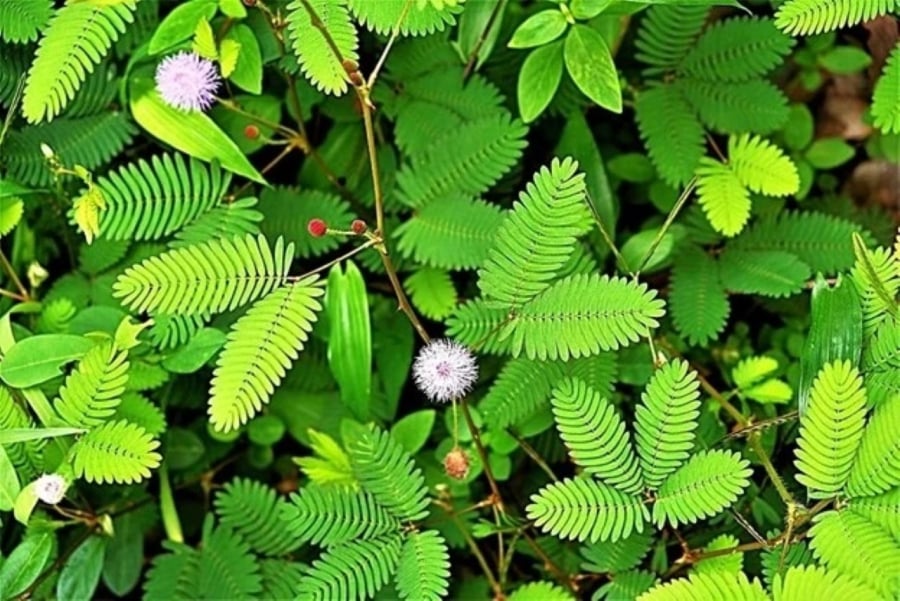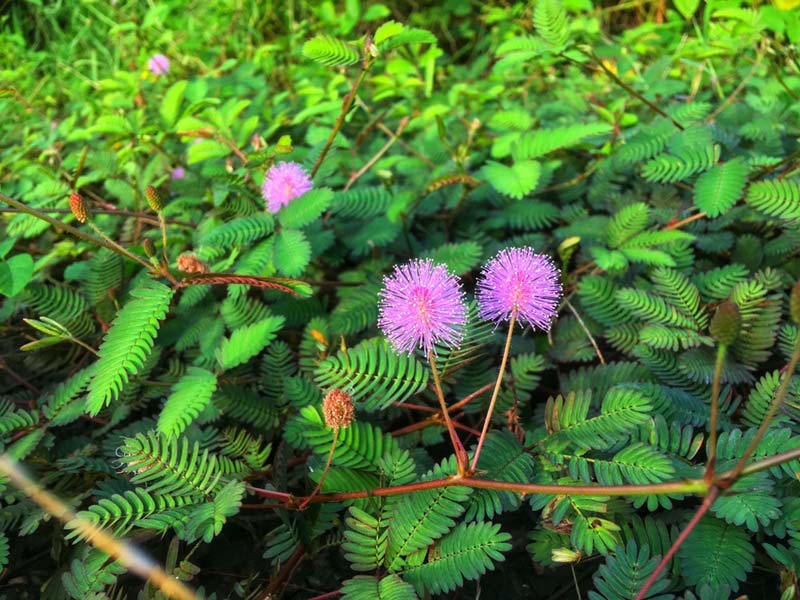In Traditional Medicine
In Traditional Chinese Medicine, the sensitive plant is believed to have a cooling nature and a sweet taste. It is used to treat insomnia, nervous exhaustion, stomach aches, conjunctivitis, hepatitis, urinary calculi, rheumatism, and high blood pressure.
In Modern Medicine
A 2001 study by Indian researchers found that extracts from the dry roots of the sensitive plant contain substances that can inhibit the activity of protease and hyaluronidase enzymes found in snake venom.

Sensitive plant/maiden tree with surprising health benefits.
Indian researchers have also indicated that this plant can influence the ovulation cycle. Additionally, Mexican scientists have shown that the dry sensitive plant contains extracts that can combat signs of depression.
Furthermore, extracts from the leaves of the sensitive plant can prevent convulsions caused by strychnine or pentylenetetrazol. The plant’s essence also helps lower blood sugar and supports the treatment of anxiety, palpitations, and a rapid heartbeat.
Health Benefits of the Sensitive Plant
1. Nervine and Stress Reliever
The active compounds in the maiden tree have a calming effect, helping to reduce stress, anxiety, and improve sleep quality. This natural solution is perfect for those who suffer from insomnia or sleep difficulties. A decoction of 10-15g of dry maiden tree can be drunk before bedtime.
Research has shown that the sensitive plant can inhibit the central nervous system, preventing and reducing seizures. Some studies have also indicated that the active compounds in this plant may improve Parkinson’s disease symptoms, such as tremors, rigidity, and difficulty moving.

Sensitive plant with many health benefits.
2. Bone and Joint Health
The sensitive plant contains compounds that act as natural pain relievers and anti-inflammatories, helping to reduce bone and joint pain, back pain, and muscle pain. Due to its pain-relieving and anti-inflammatory properties, the sensitive plant is used to support the treatment of inflammatory joint diseases such as rheumatoid arthritis and osteoarthritis.
Some studies have shown that the active compounds in the maiden tree can increase bone density and prevent osteoporosis. To relieve bone and joint pain, fresh maiden tree leaves can be applied topically. Clean the leaves, crush or blend them, and apply to the affected area. This can be combined with roasting and hot compresses using dry leaves.
3. Respiratory Support
The sensitive plant contains compounds that can thin and loosen phlegm, making it easier to expel and reducing coughing effectively. As a result, it is often used to support the treatment of respiratory tract infections such as sore throats and bronchitis, helping to soothe uncomfortable symptoms.
Several scientific studies have shown that the active compounds in the maiden tree can reduce the frequency and severity of asthma attacks. Additionally, the sensitive plant can improve lung function, making it easier for patients to breathe. The anti-inflammatory, anti-allergic, and bronchodilatory properties of the plant’s active compounds help reduce respiratory tract infections, decrease bronchial spasms, and improve air circulation in the lungs.
4. Cardiovascular Health
Research has shown that the maiden tree contains compounds that dilate blood vessels, improving blood circulation and reducing pressure on the vascular walls, thereby lowering blood pressure. This is especially beneficial for people with hypertension, helping to control blood pressure and reduce the risk of cardiovascular complications.
The sensitive plant also contains potent antioxidants that neutralize harmful free radicals in the body. These free radicals can damage cells, including cardiovascular cells, increasing the risk of cardiovascular disease. The antioxidant properties of the maiden tree help protect the cardiovascular system and maintain the health of the circulatory system.
5. Skin Infections and Inflammation
For skin infections and inflammation, the compounds in the maiden tree help kill acne-causing bacteria, reduce swelling and inflammation, and dry out pimples, promoting faster healing and preventing scar formation. In cases of skin inflammation, the maiden tree soothes symptoms such as redness, itching, and pain, providing comfort to the patient.
Fresh maiden tree leaves can be used for topical application. Clean the leaves, crush or blend them, and apply the paste to the affected area. Leave it on for 15-20 minutes, then rinse with warm water.
Precautions: The maiden tree is a valuable herb with surprising health benefits. However, it is essential to consult a doctor before use to ensure safety and effectiveness. Use the maiden tree reasonably to maximize its health benefits.



































